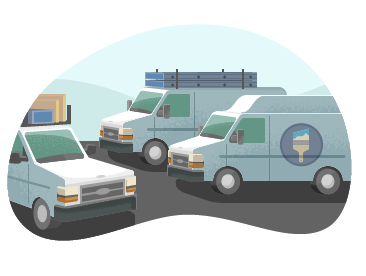
Top trucking businesses we insure
Don't see your profession? Don't worry. We insure most businesses.
Recommended insurance policies for commercial trucking
Your trucking business may also need inland marine cargo insurance, a surety bond, and trailer interchange coverage to comply with regulations and protect against industry risks.
Commercial auto insurance
Commercial auto and trailer coverage for truckers can pay for property damage and medical bills in an accident. Commercial auto insurance is required for trucking businesses in most states.
- Accidents involving commercial trucks
- Vandalism and theft
- Weather damage
General liability insurance
This policy covers common trucking risks, such as trips or falls in a dispatch office or on the grounds of any location the trucking firm uses for storage.
- Slip-and-fall accidents
- Damaged customer property
- Libel and slander lawsuits
Workers' compensation insurance
Most states require workers' comp for commercial trucking businesses with employees. It also covers work-related medical bills for sole proprietors, which personal health insurance could deny.
- Employee medical expenses
- Disability benefits
- Lawsuits from employee injuries
Business owner's policy
A BOP is a cost-effective way for businesses in the trucking industry to buy general liability coverage and commercial property insurance together. It protects against common lawsuits and property damage.
- Accidents that harm clients
- Stolen or damaged business property
- Business interruption insurance
Cyber insurance
This policy helps trucking businesses survive data breaches and cyberattacks by paying for the cost of notifying affected clients, legal fees, and other related expenses.
- Data breach lawsuits
- Fraud monitoring costs
- Cyberextortion demands
Does my trucking business need commercial auto insurance?

Most trucking businesses will need to purchase commercial auto insurance. However, the amount of coverage will depend on several factors:
- Where your business operates
- The type of cargo you move
Additionally, the Federal Motor Carrier Safety Administration (FMCSA) requires owners to have certain insurance coverages before trucks can even hit the road.
Check the laws in your state to see when coverage is required.
How much does commercial trucking insurance cost?

The cost to properly insure your commercial trucking operations business will depend on several factors, including:
- The number and type of vehicles you own
- Level of risk involved
- Your claims history
- Employee driving records
- Types of coverage, policy limits, and deductibles
How do I get commercial trucking insurance?
It’s easy to get truck insurance quotes for your business. Whether your focus is on tow trucks, box trucks, freight brokering, or off-road trucks, you’ll need to have some basic information about your business available.
Our application will ask you for your annual revenue and payroll, among other details. You can buy a policy online and get a certificate of insurance with Insureon in three easy steps:
- Complete a free online application
- Compare free quotes and choose a policy
- Pay for your policy and download a certificate for proof of insurance
Insureon's licensed insurance agents work with top-rated U.S. commercial truck insurance companies to find you the best coverage options for your business.
Whether you’re a single owner operator or work with a whole fleet of different types of trucks, such as refrigerated trucks, semi-trucks, motor carriers, tractor-trailers, or haulers, there are insurance options to meet your trucking insurance needs.
Verified business insurance reviews
Hear from customers like you who purchased small business insurance.
Common questions about commercial trucking business insurance
Does trucking liability insurance cover personal use?
Each state's department of transportation (DOT) requires drivers to buy a personal auto insurance policy for their vehicle, and most states require commercial auto insurance for company-owned vehicles.
However these insurance product’s coverage doesn’t cross over. Your personal car insurance policy won't cover an accident while on the job, and a commercial truck insurance policy won't apply to incidents during personal use.
Additionally, going without auto liability coverage can result in state penalties, as well as a possible loss of driving privileges. And a lack of comprehensive auto coverage also leaves your business vulnerable to tremendous financial losses if you’re involved in an accident.
If you or your company regularly uses rented or non-owned trucks, hired and non-owned auto (HNOA) insurance would protect your business. It would also cover a full-time employee driving their own truck for a work errand.
What is bobtail truck insurance?
If a truck driver has just delivered their haul, this coverage would ensure they're protected while the truck is not being used for trucking purposes, such as driving home.
This policy is also known as bobtail liability insurance or a non-trucking use endorsement on a business auto policy (BAP).
BAP coverage includes auto liability insurance and auto physical damage, with the option to include additional coverage. It can cover commercial vehicles that the business owns or leases, as well as employee-owned vehicles used for business purposes.
What other insurance policies should trucking businesses carry?
To fully protect your trucking business, we strongly recommend considering the following coverages:
- Cyber insurance, also called cybersecurity insurance, insures against the high cost of a data breach or a malicious software attack. It covers the cost of customer notification, credit monitoring, legal fees, and fines.
- Commercial inland marine insurance protects business property in transit, which is typically excluded from commercial property insurance.
- Trailer interchange coverage provides physical damage insurance for trailers being pulled under a trailer interchange agreement and will protect you if the trailer is damaged by collision, fire, theft, explosion, or vandalism
- Non-trucking liability (NTL) insurance covers accidents that occur while driving trucks for non-work activities, like running personal errands or driving a truck home after a drop-off.
- Motor truck cargo insurance, otherwise known as cargo insurance, provides coverage on the freight hauled by your trucking business. It covers your liability for cargo that's lost or damaged due to causes like fire, collision, or striking of a load.
- A mobile equipment endorsement extends your auto insurance coverage to include “non-auto” mobile equipment, such as a tractor or forklift, while it’s driven on a public road.
- Surety bonds guarantee your customer will receive financial reimbursement if your business fails to fulfill the terms of a trucking contract. They also help small businesses obtain necessary licenses and permits.
- Occupational accident insurance (OAI): Similar to workers' comp, this voluntary policy protects independent contractors and owner-operators from work-related medical bills.

Want free expert advice right in your inbox?
By entering your email address and subscribing, you agree to our Terms of Use and Privacy Policy
Read our blog posts

Becoming a dedicated driver for other businesses is a great way to ensure regular work as a delivery person or courier. In this article, we’ll give you tips on how to acquire clients, what insurance...

A tractor, trailer, or box truck is no good unless you have something to haul from point A to point B. But that’s easier said than done. Find out the best ways to find clients, win freight contracts,...













